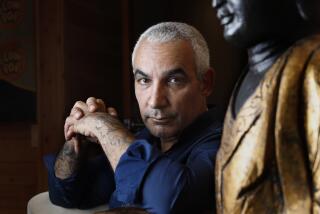Widow’s Legal Battle With Philip Morris Ends
Five years after a landmark defeat in a Los Angeles courtroom, tobacco giant Philip Morris USA has exhausted its appeals and will have to pay record damages of more than $82 million to the widow of a longtime smoker of its Marlboro cigarettes.
Without comment, the U.S. Supreme Court on Monday refused to review a 2001 verdict in the case filed by Richard Boeken of Topanga. Boeken, who began smoking in his teens, died of cancer at 57, shortly after the verdict in the first suit by an individual smoker ever tried in Los Angeles.
Although cigarette makers have agreed to some major settlements, including $246 billion to end lawsuits by the states, in more than 50 years of litigation, they have had to write checks to only a handful of individual smokers.
The Boeken award -- consisting of $5.54 million in compensatory damages, $50 million in punitive damages and more than $26 million in interest -- will be the largest recovery by an individual to date.
It will eclipse the previous record payment of $16.7 million last year to a former smoker from Glendale. Philip Morris, a unit of Altria Group Inc. and the top U.S. cigarette maker, lost that case too.
Boeken’s widow, Judy Boeken, could not be reached for comment. But her lawyer, Michael Piuze of Los Angeles, said she “is happy that the litigation’s over.”
Ed Sweda, senior attorney for the Boston-based Tobacco Products Liability Project, which encourages lawsuits against the tobacco industry, said the Supreme Court’s decision not to accept the appeal “demonstrates that tobacco litigation remains a viable -- and still emerging -- strategy to promote the public health.”
Still, the award is a wisp of its original self. Outraged jurors in Los Angeles County Superior Court had ordered Philip Morris to pay Boeken $3 billion in addition to compensatory damages in June 2001 after finding the company guilty of fraud, negligence, misrepresentation and selling a defective product.
Weeks later, the trial judge sliced the punitive award to $100 million. A California appeals court then trimmed it to $50 million, despite its finding that Philip Morris’ conduct was “extremely reprehensible.”
“The very conduct that injured Boeken was directed at all smokers in the United States, repeated over many years with knowledge of the risk to human life and health,” and demonstrated “intentional deceit,” the state appeals court ruled last year.
But the panel also cited a 2003 U.S. Supreme Court opinion that punitive damages usually should not exceed nine times the compensatory damages. That ratio was reflected in the state appeals court ruling.
Piuze had argued that the ratio was a guideline, not a rule, and should not protect a company that he said was responsible for millions of deaths.
Although the court’s decision Monday was a victory for the plaintiff, Piuze said he was not satisfied “with the end result, which is a penalty of one half week of earnings” for Philip Morris.
Steven Rissman, associate general counsel for Altria Corporate Services Inc., another unit of Altria, said Monday that he was not surprised the Supreme Court declined to review the case. “You can never have the highest of expectations when you’re talking about a court that accepts less than 100 of the 7,000 petitions that it’s presented each year.”
Legal analysts believe that the court may be more likely to consider an appeal of another verdict that went well beyond the 9-to-1 guideline.
It’s an Oregon case in which the $80-million award against Philip Morris includes $79.5 million in punitive damages and $521,000 in compensatory damages -- a ratio of more than 152 to 1.
The Oregon Supreme Court affirmed the verdict last month, setting the stage for a last-ditch appeal to the nation’s highest court.
The Boeken verdict was among a string of four straight big defeats for cigarette makers in Los Angeles and San Francisco superior courts.
Rissman noted that since the last of these plaintiffs’ victories in 2002, Philip Morris has successfully defended five consecutive individual smoker cases in California.
Altria shares rose 4 cents Monday to $73.59.
More to Read
Inside the business of entertainment
The Wide Shot brings you news, analysis and insights on everything from streaming wars to production — and what it all means for the future.
You may occasionally receive promotional content from the Los Angeles Times.










